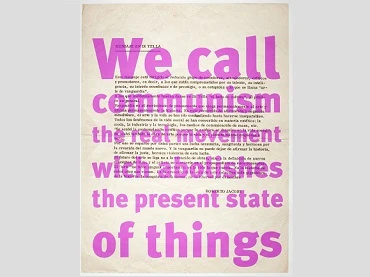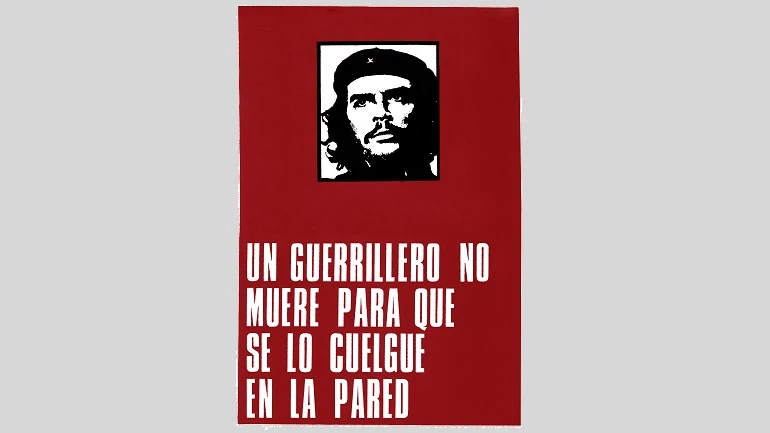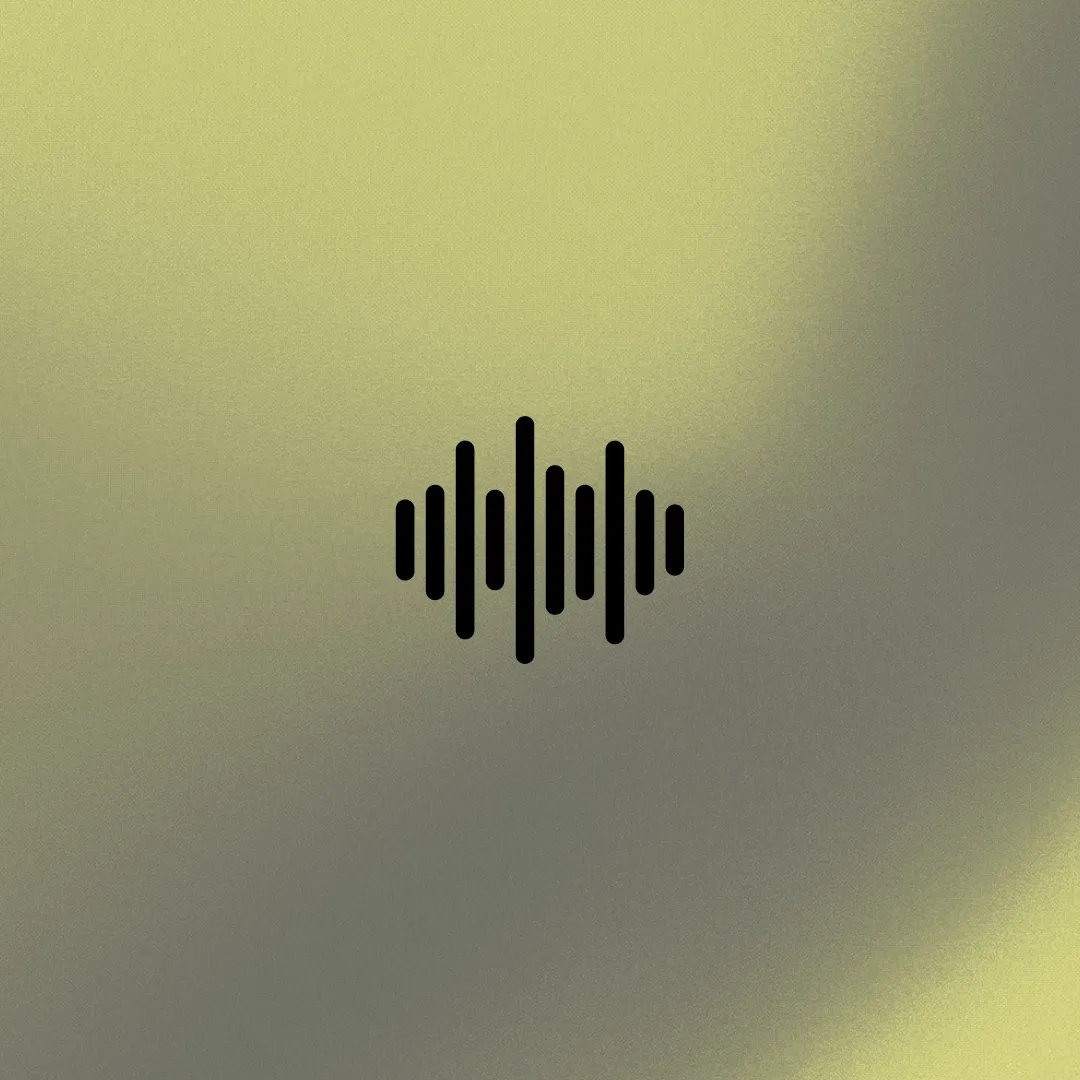Populism. A Dialogue on Art, Representation and Institutions in the Crisis of Democracy
A Conversation between Chantal Mouffe and Didier Eribon

Roberto Jacoby. 1968: el culo te abrocho. Cartel intervenido, 2008
Held on 08 Jun 2017
In recent years, the museum confederation L’Internationale, made up of Van Abbemuseum (Eindhoven), the Museum Hedendaagse Kunst Antwerpen (Antwerp), the Moderna galerija (Ljubljana), SALT (Istanbul), the Museu d’ Art Contemporani de Barcelona (Barcelona) and the Museo Reina Sofía (Madrid), has been investigating the instability of the current geopolitical and ecological configuration of the contemporary world, striving to activate the values of culture and international collaboration as potential resistance. What single contribution can museums and cultural institutions offer to counteract the crisis hitting the current globalised and fragmented society? How can research, dialogue and the difference between cultural institutions be devised constructively to forge long-lasting ties between different communities? The upshot of this line of work is the advent of the public programme Dialogues, a series of conversations programmed in different member museums, and the touchstone of this activity.
Dialogues invites eminent thinkers, artists, activists and cultural workers to debate four theoretical strands: Who is speaking? Representation and non-representation on (art) policies today; What is right? Populism in an era of post-truth; What needs to change? Transformations and institutions’ futures; Where is the South? Knowledge and epistemology from the Global South. Revolving around the first two axes, and gaining momentum towards the third, this conversation approaches the term “populism”. If there is one conclusion that can be drawn from the writings on this notion, then it involves at once an unsatisfactory definition and becomes the target of the most compounded attacks, at the same time as it evokes the most imaginative possibilities of representative democracy and its institutions. Political theorist Chantal Mouffe and philosopher Didier Eribon do not seek to define the term as a universal category, but look to present two opposing concepts of it, and, ultimately, explore the relationship it bears with the space of representation and the mobilisation of culture and the museum institution.
At one end, Chantal Mouffe upholds that liberal democracy proceeds from two conflicting ideas: liberal freedom versus equality. The confrontation of these two incompatible traditions means that political space is, in her words, an “agonistic” place. In recent decades, the predominance of financial capital has been so absolute that it has displaced and cancelled out the antagonism of these two historical options, and in this post-political setting Mouffe asserts that rethinking such frontiers is essential; not so much between left and right, but between the oligarchy and the society dispossessed in this process. Art and its institutions, in their capacity of collective representation, play a key role in this tract. At the other end, Didier Eribon wholly rejects the new binary opposites between those at the top and those at the bottom, scotching their uniformity in the excess of a complex and diverse social body, and maintaining a return to the notion of difference and the critique of the place of enunciation (those who speak and from where), characterising the so-called cultural wars from the 1970s. Both authors will, first and foremost, present these two positions before debating them.
Framework
Organised by
Museo Reina Sofía

Participants
Chantal Mouffe. Philosopher and political theorist. She is a professor at the Centre for the Study of Democracy at the University of Westminster, and has been guest professor at Harvard, Cornell, the University of California, Princeton, and the Centre National de la Recherche Scientifique in Paris. Between 1989 and 1995 she was director of the College International de Philosophie Programme in Paris, and is the author of a range of noteworthy publications, translated into multiple languages, on the space of democracy linked to the fight for pluralism. Her numerous essays include Hegemony and Socialist Strategy. Towards a Radical Democratic Politics, with Ernesto Laclau (1985),On the Political (2005) and Agonistics. Thinking the World Politically (2014).
Didier Eribon. Philosopher and sociologist. As a lecturer at the University of Amiens, he is the author of Michel Foucault (1992), the most complete intellectual biography on the philosopher to date, Reflections on the Gay Question (2001), A Moral of the Minority (2004), Escaping Psychoanalysis (2008), and Return to Reims (2013). Moreover, his work is an example of dissident prose, understood as a confrontation between the canon and the norm.


Más actividades
![Tracey Rose, The Black Sun Black Star and Moon [La luna estrella negro y negro sol], 2014.](https://recursos.museoreinasofia.es/styles/small_landscape/public/Obra/AD07091_2.jpg.webp)
On Black Study: Towards a Black Poethics of Contamination
Monday 27, Tuesday 28 and Wednesday 29 of April, 2026 – 16:00 h
The seminar On Black Study: Towards a Black Poethics of Contamination proposes Black Study as a critical and methodological practice that has emerged in and against racial capitalism, colonial modernity and institutional capture. Framed through what the invited researcher and practitioner Ishy Pryce-Parchment terms a Black poethics of contamination, the seminar considers what it might mean to think Blackness (and therefore Black Study) as contagious, diffuse and spreadable matter. To do so, it enacts a constellation of diasporic methodologies and black aesthetic practices that harbor “contamination” -ideas that travel through texts, geographies, bodies and histories- as a method and as a condition.
If Blackness enters Western modernity from the position of the Middle Passage and its afterlives, it also names a condition from which alternative modes of being, knowing and relating are continually forged. From within this errant boundarylessness, Black creative-intellectual practice unfolds as what might be called a history of touches: transmissions, residues and socialities that unsettle the fantasy of pure or self-contained knowledge.
Situated within Black radical aesthetics, Black feminist theory and diasporic poetics, the seminar traces a genealogy of Black Study not as an object of analysis but as methodological propositions that continue to shape contemporary aesthetic and political life. Against mastery as the horizon of study, the group shifts attention from what we know to how we know. It foregrounds creative Black methodological practices—fahima ife’s anindex (via Fred Moten), Katherine McKittrick’s expansive use of the footnote, citation as relational and loving labour, the aesthetics of Black miscellanea, and Christina Sharpe’s practices of annotation—as procedures that disorganise dominant regimes of knowledge. In this sense, Black Study is approached not as a discrete academic field but as a feel for knowing and knowledge: a constellation of insurgent practices—reading, gathering, listening, annotating, refusing, world-making—that operate both within and beyond the university.
The study sessions propose to experiment with form in order to embrace how ‘black people have always used interdisciplinary methodologies to explain, explore, and story the world.’ Through engagements with thinkers and practitioners such as Katherine McKittrick, C.L.R. James, Sylvia Wynter, Christina Sharpe, Fred Moten, Tina Campt, Hilton Als, John Akomfrah, fahima ife and Dionne Brand, we ask: What might it mean to study together, incompletely and without recourse to individuation? How might aesthetic practice function as a poethical intervention in the ongoing work of what Sylvia Wynter calls the practice of doing humanness?

Intergenerationality
Thursday, 9 April 2026 – 5:30pm
This series is organised by equipoMotor, a group of teenagers, young people and older people who have participated in the Museo Reina Sofía’s previous community education projects, and is structured around four themed blocks that pivot on the monstrous.
The third session gazes at film as a place from which to dismantle the idea of one sole history and one sole time. From a decolonial and queer perspective, it explores films which break the straight line of past-present-future, which mix memories, slow progress and leave space for rhythms which customarily make no room for official accounts. Here the images open cracks through which bodies, voices and affects appear, disrupting archive and questioning who narrates, and from where and for whom. The proposal is at once simple and ambitious: use film to imagine other modes of remembering, belonging and projecting futures we have not yet been able to live.

Remedios Zafra
Thursday March 19, 2026 - 19:00 h
The José Luis Brea Chair, dedicated to reflecting on the image and the epistemology of visuality in contemporary culture, opens its program with an inaugural lecture by essayist and thinker Remedios Zafra.
“That the contemporary antifeminist upsurge is constructed as an anti-intellectual drive is no coincidence; the two feed into one another. To advance a reactionary discourse that defends inequality, it is necessary to challenge gender studies and gender-equality policies, but also to devalue the very foundations of knowledge in which these have been most intensely developed over recent decades—while also undermining their institutional support: universities, art and research centers, and academic culture.
Feminism has been deeply linked to the affirmation of the most committed humanist thought. Periods of enlightenment and moments of transition toward more just social forms—sustained by education—have been when feminist demands have emerged most strongly. Awareness and achievements in equality increase when education plays a leading social role; thus, devaluing intellectual work also contributes to harming feminism, and vice versa, insofar as the bond between knowledge and feminism is not only conceptual and historical, but also intimate and political.
Today, antifeminism is used globally as the symbolic adhesive of far-right movements, in parallel with the devaluation of forms of knowledge emerging from the university and from science—mistreated by hoaxes and disinformation on social networks and through the spectacularization of life mediated by screens. These are consequences bound up with the primacy of a scopic value that for some time has been denigrating thought and positioning what is most seen as what is most valuable within the normalized mediation of technology. This inertia coexists with techno-libertarian proclamations that reactivate a patriarchy that uses the resentment of many men as a seductive and cohesive force to preserve and inflame privileges in the new world as techno-scenario.
This lecture will address this epochal context, delving into the synchronicity of these upsurges through an additional parallel between forms of patriarchal domination and techno-labor domination. A parallel in which feminism and intellectual work are both being harmed, while also sending signals that in both lie emancipatory responses to today’s reactionary turns and the neutralization of critique. This consonance would also speak to how the perverse patriarchal basis that turns women into sustainers of their own subordination finds its equivalent in the encouraged self-exploitation of cultural workers; in the legitimation of affective capital and symbolic capital as sufficient forms of payment; in the blurring of boundaries between life and work and in domestic isolation; or in the pressure to please and comply as an extended patriarchal form—today linked to the feigned enthusiasm of precarious workers, but also to technological adulation. In response to possible resistance and intellectual action, patriarchy has associated feminists with a future foretold as unhappy for them, equating “thought and consciousness” with unhappiness—where these have in fact been (and continue to be) levers of autonomy and emancipation.”
— Remedios Zafra

ARCO2045. The Future, for Now
Saturday 7, March 2026 - 9:30pm
The future, its unstable and subjective nature, and its possible scenarios are the conceptual focus of ARCOmadrid 2026. A vision of the future linked to recent memory, a flash of insight into a double-edged sword. This year's edition, as in the previous two, will once again hold its closing party at the Reina Sofia Museum. This time, the star of the show is Carles Congost (Olot, Girona, 1970), one of the artists featured in the new presentation of the Collections recently inaugurated on the 4th floor of the Sabatini Building.
Carles Congost, with his ironic and timeless gaze, is responsible for setting the tone for this imperfect future, with a DJ session accompanied by some of his works in the Cloister on the first floor of the Sabatini Building of the Museo on the night of Saturday 7 March.

27th Contemporary Art Conservation Conference
Wednesday, 4, and Thursday, 5 March 2026
The 27th Contemporary Art Conservation Conference, organised by the Museo Reina Sofía’s Department of Conservation and Restoration, with the sponsorship of the Mapfre Foundation, is held on 4 and 5 March 2026. This international encounter sets out to share and debate experience and research, open new channels of study and reflect on conservation and the professional practice of restorers.
This edition will be held with in-person and online attendance formats, occurring simultaneously, via twenty-minute interventions followed by a five-minute Q&A.

